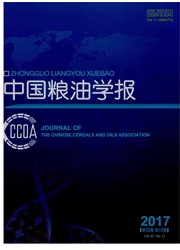

 中文摘要:
中文摘要:
以花生仁和芝麻籽为原料,研究了炒籽温度和炒籽时间对其油脂中16种多环芳烃含量的影响。结果表明,随着炒籽温度的提高及炒籽时间的延长,花生油和芝麻油中Bap、PAH4、PAH16的含量都呈明显上升趋势。对照GB2716及欧盟No 835/2011中对Bap、PAH4的限量规定,花生仁的合理炒籽温度为不超过160℃、炒籽时间不超过20 min,芝麻的合理炒籽温度为不超过180℃、炒籽时间不超过20 min。在优化的炒籽条件下,花生油中Bap、PAH4、PAH16含量(μg/kg)分别从原料中的0.31、4.60、16.69增加至1.07、11.98、48.86,芝麻油中Bap、PAH4、PAH16含量分别从原料中的0.63、5.23和21.84增加至0.93、8.28和47.95。
 英文摘要:
英文摘要:
The effect of roasting temperature and time on PAH content in peanut and sesame have been studied in the paper. The results showed that the concentrations of Bap,PAH4 and PAH16 had increased in line with lengthening the roasting temperature and time. Following the limitation of GB 2716—2005 and EU 835 /2011,the optimal roasting conditions of peanut were lower than 160℃ and 20 min,the optimal roasting conditions of sesame were lower than 180 ℃ and 20 min. Under the best experimental conditions,the concentrations of Bap,PAH4 and PAH16 in peanut oil were increased from 0. 31,4. 60 and 16. 69 μg / kg to 1. 07,11. 98,48. 86 μg / kg,the concentrations of Bap,PAH4 and PAH16 in sesame oil were increased from 0. 63,5. 23 and 21. 84 μg / kg to 0. 93,8. 28 and 47. 95 μg / kg.In order to ensure the quality of edible oils,roasting conditions should be strictly controlled in the production of fragrance oils.
 同期刊论文项目
同期刊论文项目
 同项目期刊论文
同项目期刊论文
 期刊信息
期刊信息
